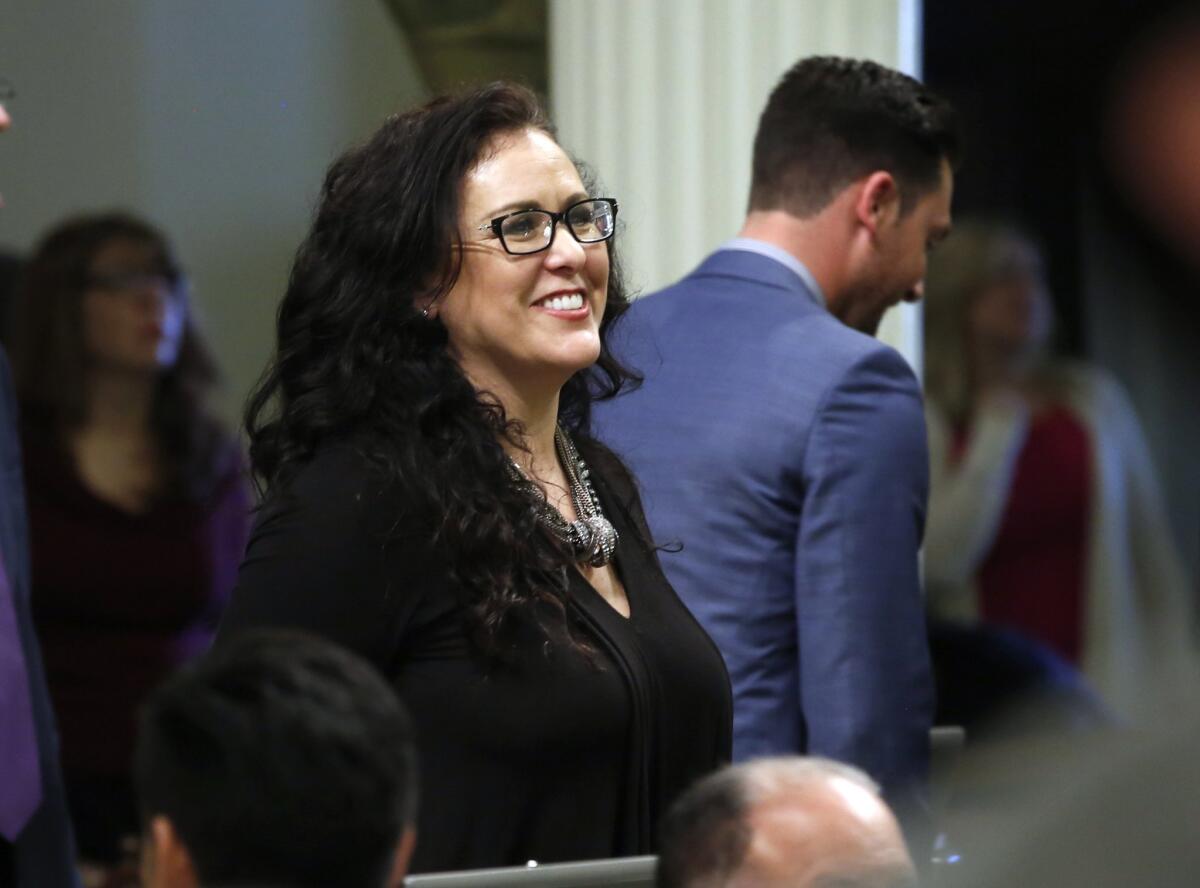Uber and Postmates call AB 5 unconstitutional in new lawsuit

With two days to go before a new law makes it harder to treat workers as contractors in California, Uber and Postmates filed a legal challenge alleging it violates individuals’ constitutional rights and unfairly discriminates against technology platforms and those who make a living through them.
The suit, which names the state of California and Atty. Gen. Xavier Becerra as defendants, is part of the on-demand industry’s multimillion-dollar campaign to fight Assembly Bill 5. The companies also submitted a ballot initiative in October.
In the complaint, filed in U.S. District Court, the plaintiffs, who also include on-demand drivers Lydia Olson and Miguel Perez, call AB 5, which was signed into law in September and takes effect Jan. 1, an “irrational and unconstitutional statute designed to target and stifle workers and companies in the on-demand economy” and accuse its author, Assemblywoman Lorena Gonzalez (D-San Diego), of being overtly hostile to the gig companies.
“Rather than embrace how the on-demand economy has empowered workers, benefited consumers, and fueled economic growth, some California legislators have irrationally attacked it,” the suit reads.
In a statement, Gonzalez said this was yet another move that showed Uber “will do anything to try to exempt themselves from state regulations that make us all safer and their driver employees self-sufficient.”
“First, Uber sought not only an exemption from AB 5 but from all California labor laws,” Gonzalez said. “Then, they said they wouldn’t abide by AB 5 anyway. Then, they said AB 5 didn’t apply to them because they weren’t a transportation company. Then, they said they would create a ballot initiative to exempt themselves from AB 5. And now Uber is in court bizarrely trying to say AB 5 is unconstitutional.”
Becerra’s office said it will review the complaint.
Under AB 5, workers will be considered employees of a business unless an employer can show they meet a detailed set of criteria established by a California Supreme Court ruling last year.
The companies spent the better part of 2019 fighting the bill, which would force the companies to afford drivers employer-provided health insurance, paid time off and other perks. Uber and Lyft executives argued treating drivers as employees would destroy the efficiencies underpinning their business model. The tech firms proposed an alternative deal that would allow the industry to continue treating gig workers as contractors while also providing some benefits typically reserved for employees such as minimum pay. However, Gonzalez ruled out such a compromise, driving Uber, Lyft and Doordash to take their case directly to voters with a $90 million ballot initiative.
In their lawsuit, Uber and Postmates say AB 5 violates several constitutional rights including the equal protection and due process clauses of the Fourteenth Amendment, the Ninth Amendment, and the contracts clause of Article I.
They also allege the law violates the equal protection clause, inalienable rights clause, due process clause, Baby Ninth Amendment, and contracts clause of the California Constitution. The companies are seeking declaratory and injunctive relief from the law as part of the suit.
The allegation of equal protection violation arises from the large number of occupations exempted from AB 5 under heavy lobbying. The “laundry list of exemptions,” is proof of its “irrationality,” argue the plaintiffs.
In fact, they note, the bulk of the statute’s language is devoted to enumerating the types of jobs it doesn’t apply to, a list that includes direct salespeople, travel agents, grant writers, construction truck drivers and commercial fisherman. “There is no rhyme or reason to these nonsensical exemptions, and some are so ill-defined or entirely undefined that it is impossible to discern what they include or exclude,” reads the complaint. If the connection between a statute’s means and its goals is insufficiently straightforward, it can be invalidated on the grounds that it lacks “rational basis.”
On-demand companies are not alone in their resistance to AB 5. Freelance journalists are also scrambling to understand how the law might affect their livelihoods. Some have voiced worries that smaller newspapers or websites might not have the resources to convert freelancers to staff members and AB 5 could discourage employers from hiring Californians to avoid added paperwork and legal liabilities. Vox Media said Dec. 16 it would end contracts with hundreds of freelance writers and editors in California who produce sports content for SB Nation in order to come into compliance.
Two groups representing freelance writers and photographers filed a lawsuit Dec. 17 in federal court in Los Angeles alleging AB 5 unconstitutionally restricts free speech and the media.








